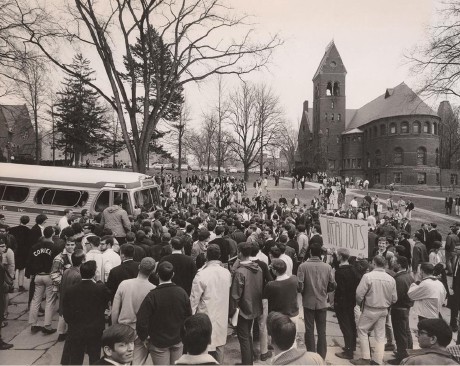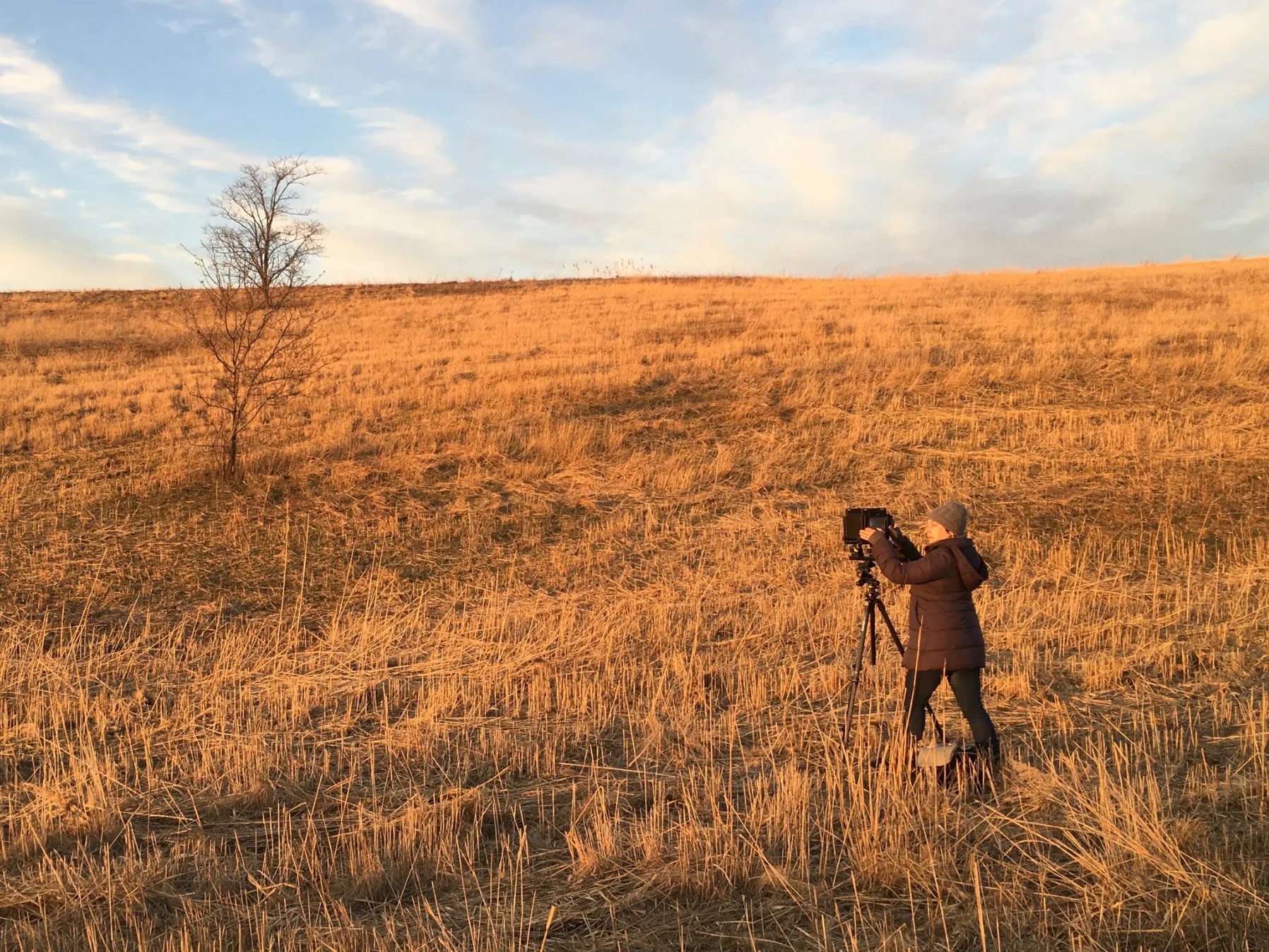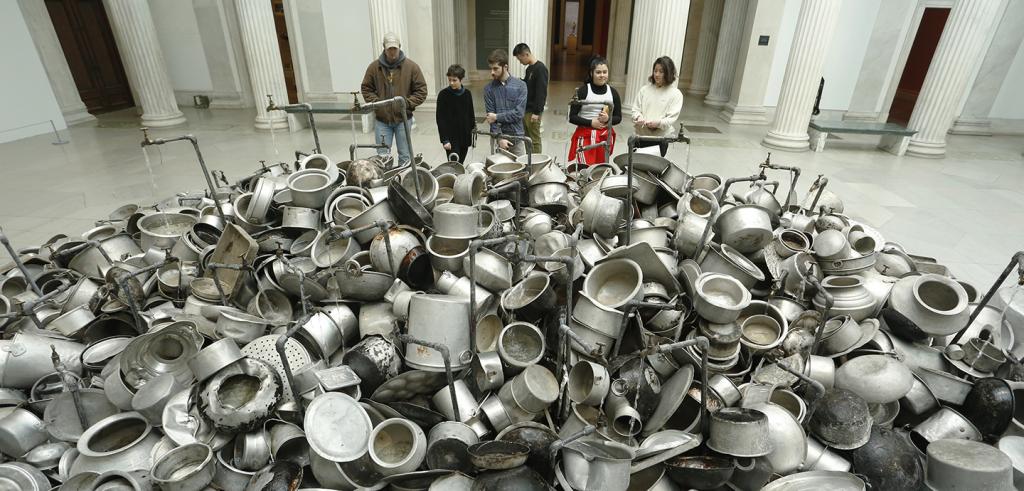News and Events
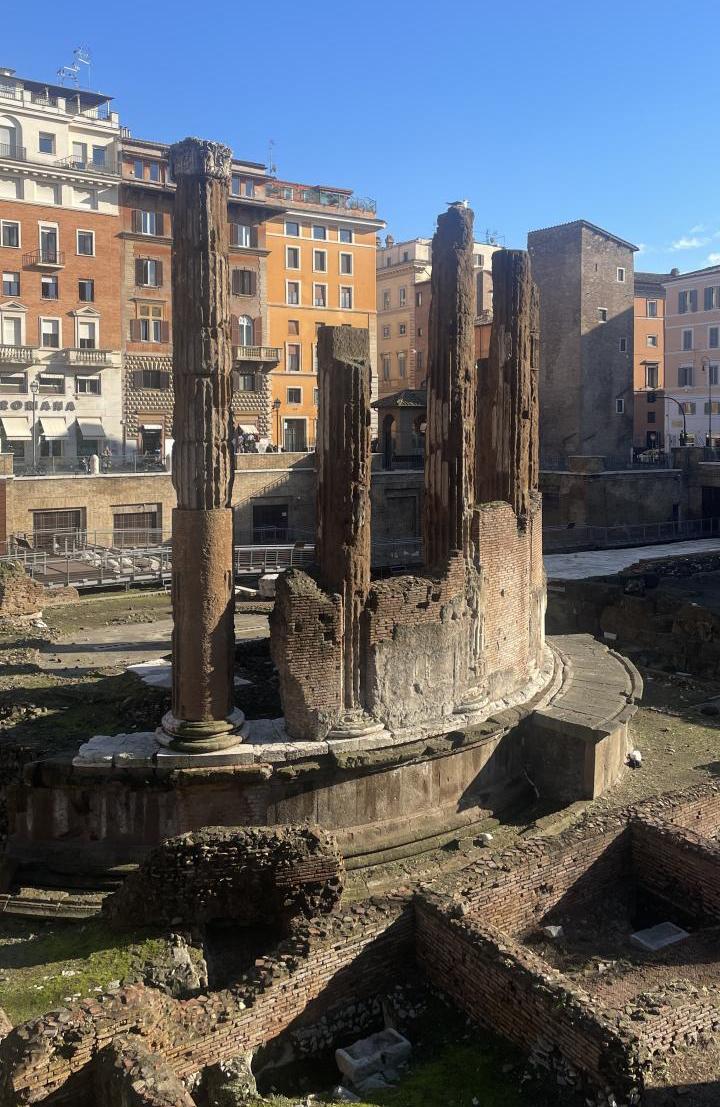
Photo of Torre Argentina Cat Sanctuary at the the ancient ruins of Largo di Torre Argentina. This site is very near to the Cornell in Rome program at Palazzo Santacroce. Photo by Jenni Minner.
Just Places Lab research continues from Cornell in Rome, Italy, & Across New York State
Jenni Minner, Director of Just Places Lab, is presently teaching and conducting research from Rome, Italy. She is co-teaching the Rome Workshop with Dr. Cora Fontana, Dr. Greg Smith, Dr. Fabrizio Felici, and Dr. Marco Gissara. The Rome Workshop is a required course for students enrolled in the Cornell in Rome program.
Dr. Minner is also collaborating with Dr. John Carruthers and participating graduate student researchers to conduct an analysis of Preservation Trades across New York State to inform the work of the Preservation League of New York State.
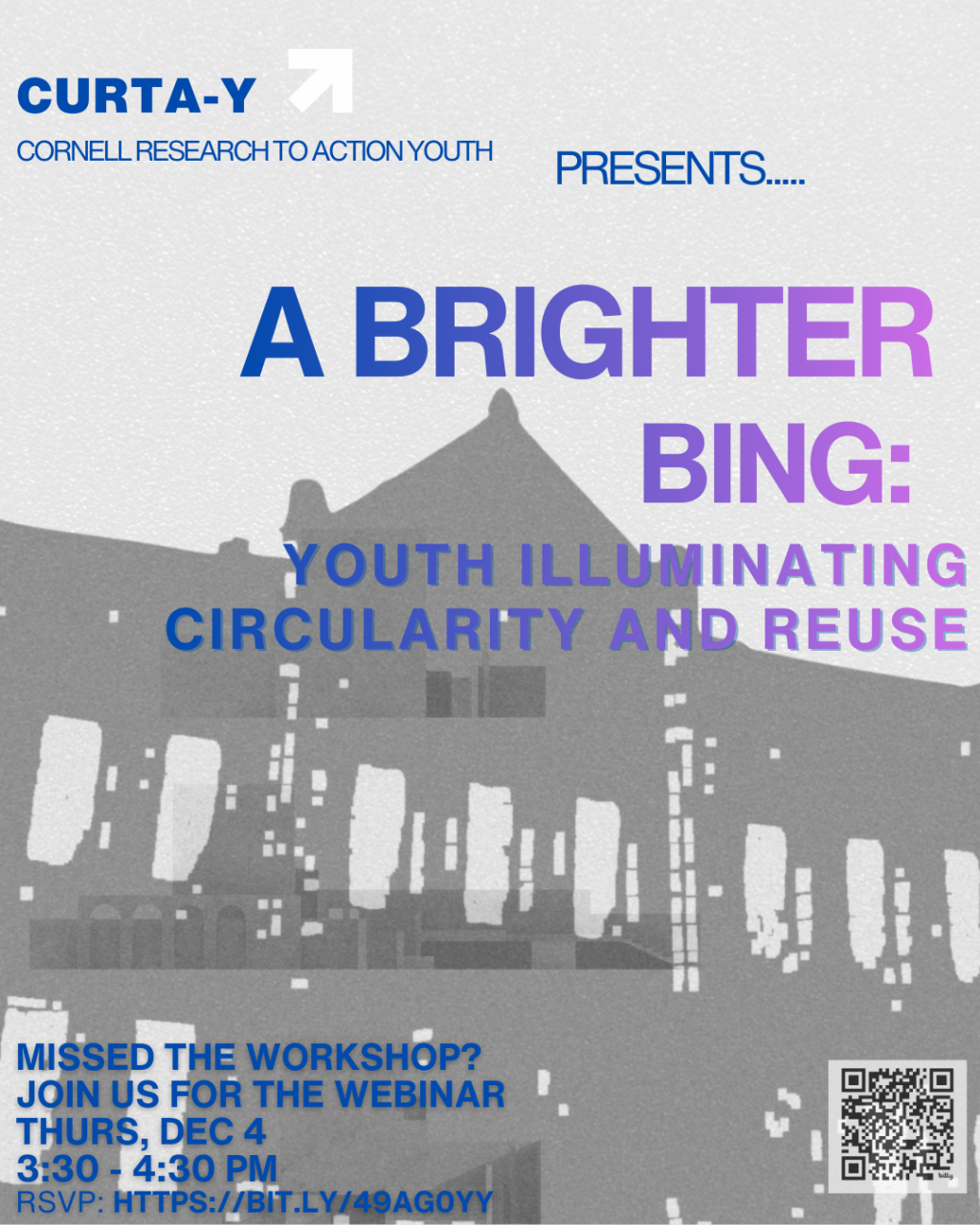
A Brighter Bing: Youth Illuminating Circularity and Reuse
Join this webinar on Thursday, December 4, 3:30 - 4:30 US eastern time on Zoom to learn what circularity and a spectrum of reuse – from historic preservation to deconstruction and reuse - means to youth in Binghamton, New York.
Binghamton and Vestal High School students and Cornell students involved with the Cornell Urban Research to Action – Youth (CURTA-Y) program will talk about their proposals for a Deconstruction and Reuse Resolution for the City of Binghamton and pitch creative interventions to illuminate circularity and their city at the annual LUMA Projection Arts Festival. CURTA-Y is a program of the Just Place Lab that connects Cornell students with high school students to work toward creating a more circular and sustainable built environment in their community.
RSVP on the Circularity, Reuse, and Zero Waste Development (CR0WD) website
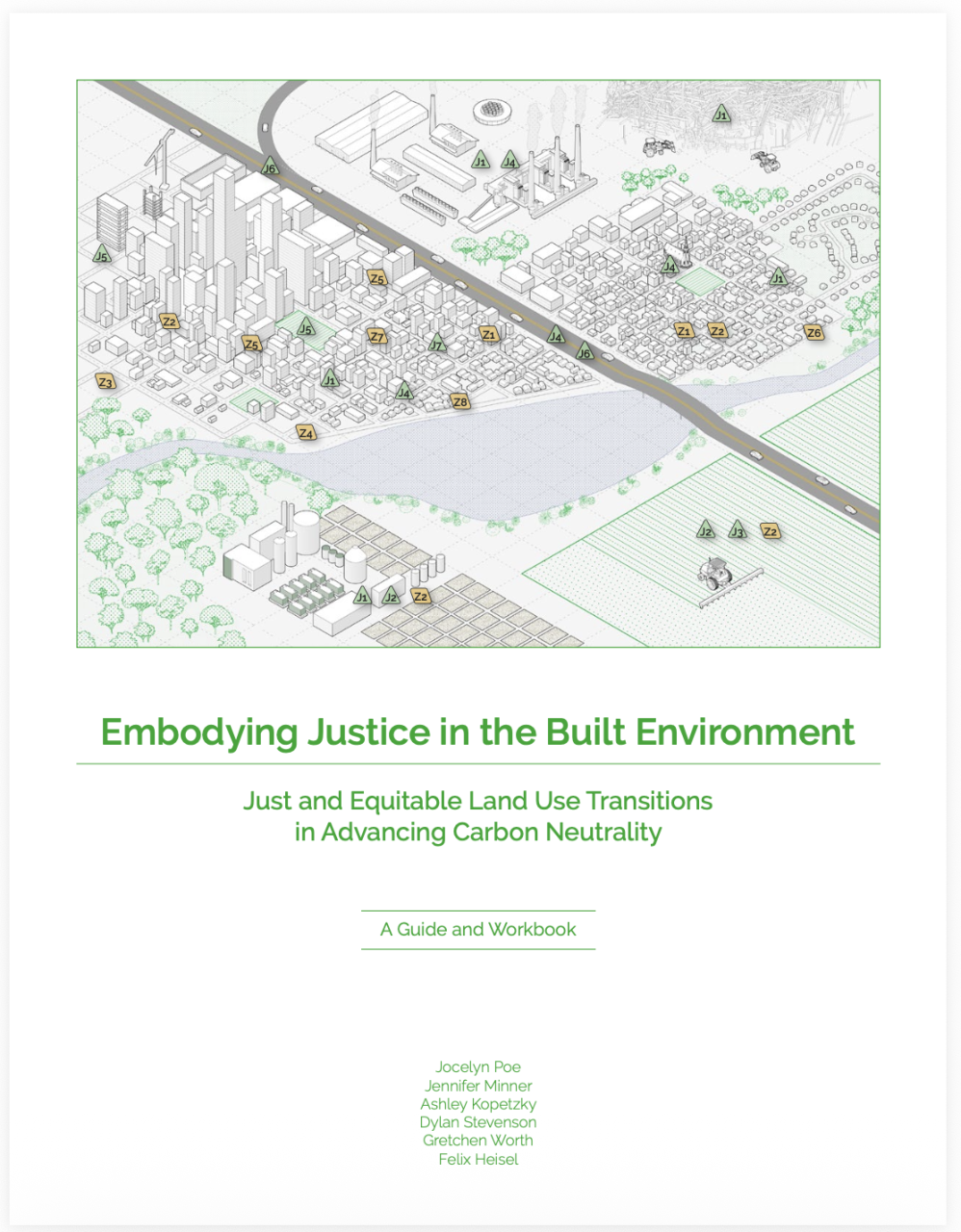
Embodying Justice and Equitable Land Use Transitions
Embodying Justice in the Built Environment: Just and Equitable Land Use Transitions in Advancing Carbon Neutrality is a workbook that provides a framework for centering justice in land use planning for a carbon-neutral future.
This newest guide was created by the Reparative Praxis Lab (Jocelyn Poe, PhD, AICP), Just Places Lab (Jennifer Minner, Ashley Kopetzky, LFA), and the Circular Construction Lab (Felix Heisel) at Cornell AAP; Dylan Stevenson, PhD, AICP at the University of Washington College of Built Environments; and the Susan Christopherson Center for Community Planning. Additional student researchers and writers include: Deirdre Kennedy, Alexandra Shoneyin, Justin Peng, David Pervosek, and Najeh Abduljalil.
Working with the Carbon Neutral Cities Alliance leadership and member cities, the research team developed this free, practical guide with question sets and practice stories about how cities can address equities and injustices in the built environment while working to lower embodied carbon. This is the second guide and workbook in the Embodying Justice in the Built Environment series.
Download the guide and register to join the public webinar on November 24 at 9:00 a.m. PT / 12:00 p.m. ET.
https://lnkd.in/d8bp_rCB
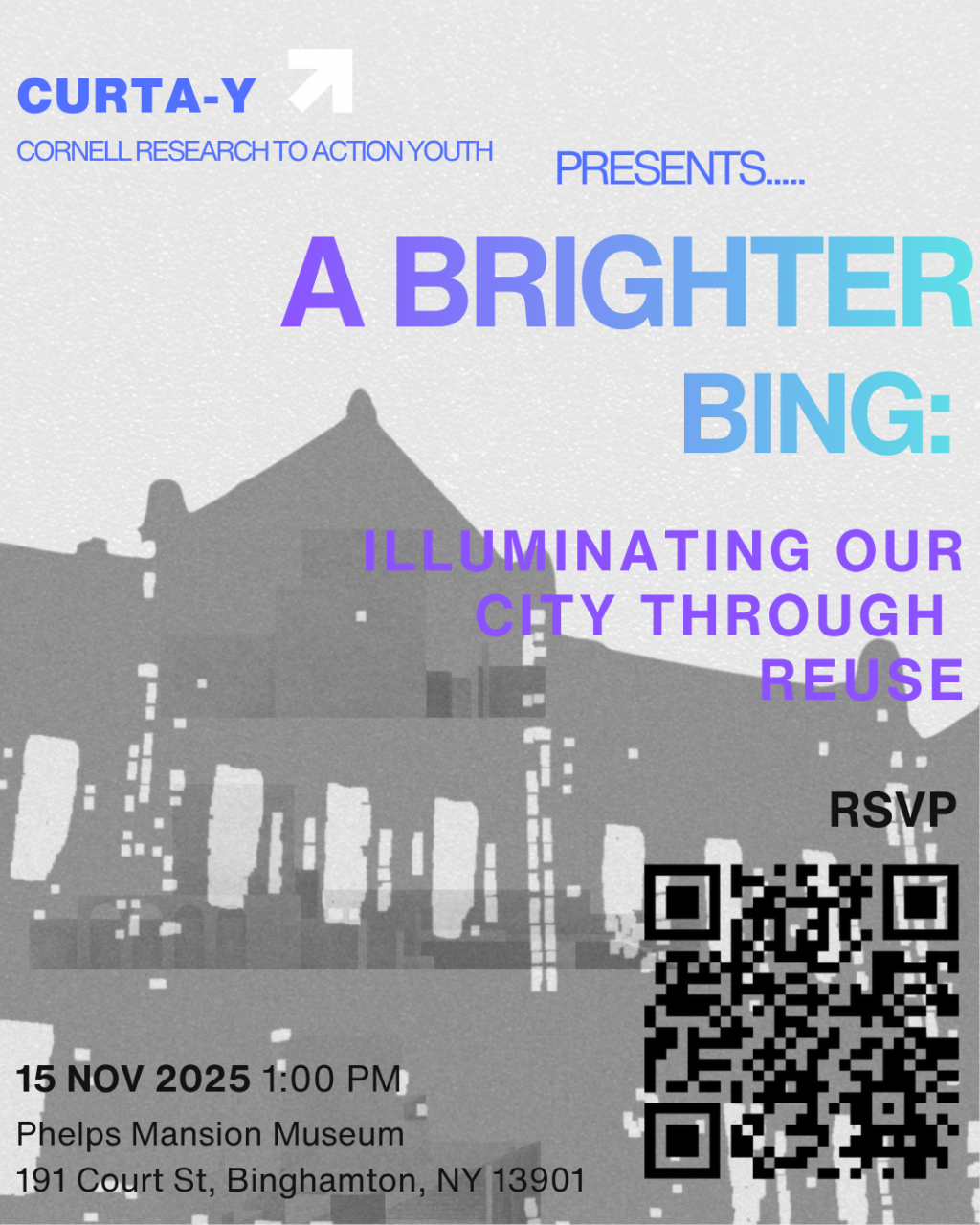
A Brighter Bing: Illuminating our City through Reuse
On November 15th, local high school students from Binghamton and Vestal involved in the Just Places Lab's Cornell Urban Research to-Action Youth (CURTA-Y) will be pitching their findings on the benefits of implementing circularity in Binghamton. They will be sharing bright ideas for a Deconstruction and Reuse Resolution and for the LUMA Festival that highlights opportunities for historic preservation and building material reclamation and reuse.
This event will occur from 1-3 PM at the Phelps Mansion Museum, 191 Court St, Binghamton NY.
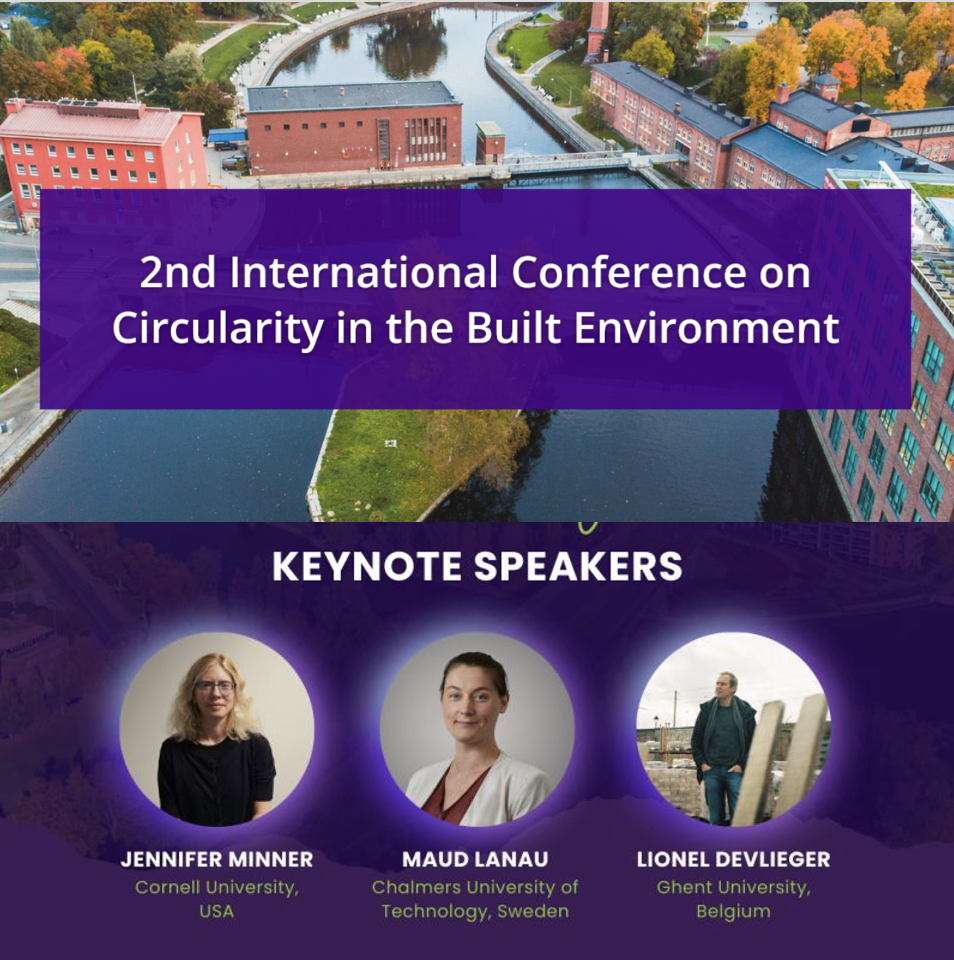
Dr. Jennifer Minner was a keynote speaker for the 2nd International Conference on Circularity in the Built Environment in Tampere, Finland, on Tuesday, September 16, 2025. The title of her speech was Hope in Circulation: Places Where Circularity and Reuse Build Community and Spark Innovation. She spoke about how circularity offers a powerful framework for seeing the built environment in a new light. As a set of ideas, practices, and technologies, circularity can spur imagination, generating new energy and creativity in caring for places. Circularity illuminates how we build, maintain, and demolish places under linear systems. It exposes the dark sides of this linear system of demolition and waste, while inspiring alternatives that reorder those material and social relationships into a more regenerative system. Through a circular imagination, we can sharpen education and technology and their application in building a more sustainable and equitable built environment. Circularity can also encourage innovative forms of governance. In these ways, circularity becomes a magnifying glass for social systems and a projection of hope in building better futures.
This talk foregrounds insights from collaborative research with community leaders, fellow researchers, and local and state officials within the Circularity, Reuse, and Zero Waste Development (CR0WD) network. Next, it highlights insights from the creation of the Embodying Justice in the Built Environment. Following, the talk spotlights the incredible creativity and drive of youth involved in learning about circularity and applying its ideas to their community. The talk will mention the development of analytical tools and methods for visualizing a spectrum of reuse in the local built environment in Ithaca, New York. The talk concludes with an emphasis on the importance of bringing together the tools, methods, creativity, and insights from researchers around the world at the 2nd Circularity in the Built Environment Conference.
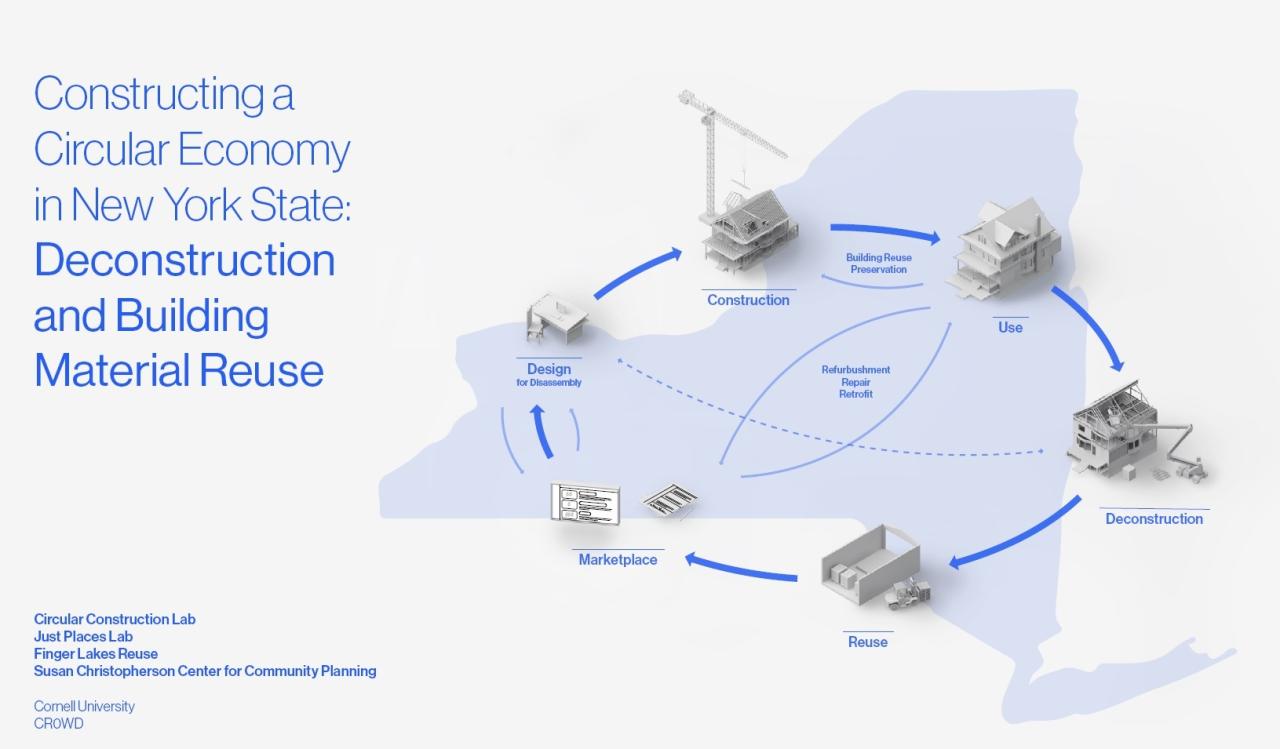
Constructing a Circular Economy in NYS: Deconstruction and Building Material Reuse is a new white paper authored by Cornell University researchers led by the Circular Construction Lab and Just Places Lab in collaboration with community organizations and industry experts within the New York State-based Circularity, Reuse, and Zero Waste Development (CR0WD) network. This research was generously supported by The 2030 Project, a Cornell University climate initiative housed within the Atkinson Center for Sustainability.
The white paper consists of an analysis of the current linear construction economy in New York State, an assessment of the economic, environmental, and social potential of deconstruction and reuse, and state-level policy and practice recommendations based on this assessment. The intent of this analysis is to aid policymakers, state agencies, and local governments in the development of a circular economy in New York State. Read more and download the report.
Register for a CR0WD Conversation about the launch of this new report
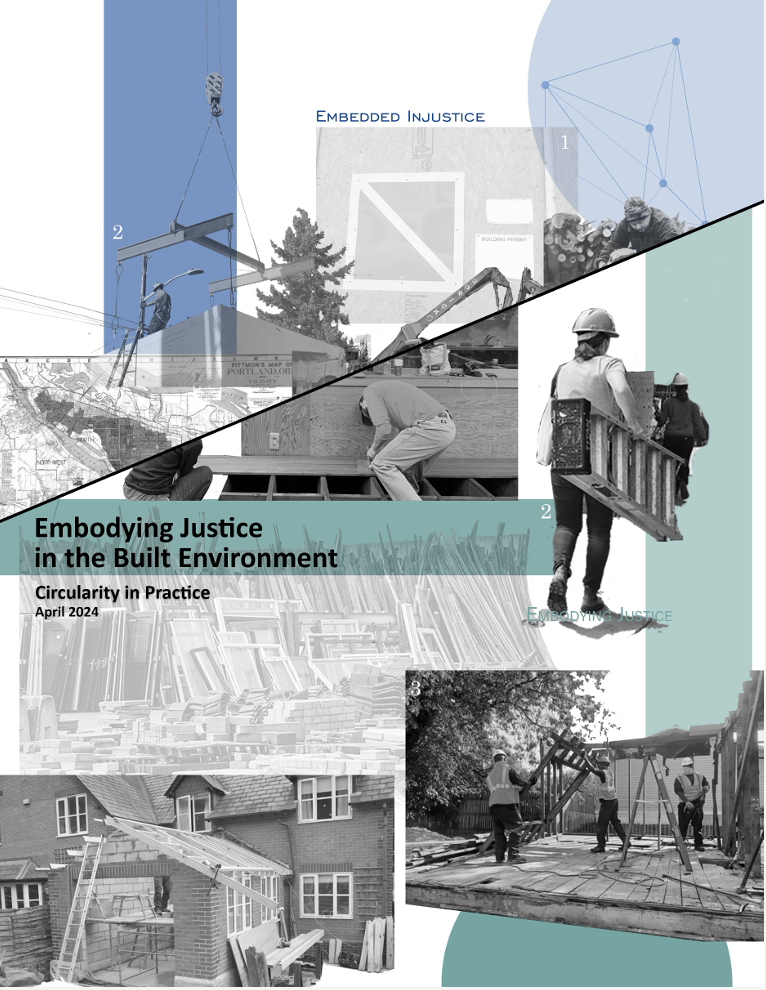
Embodying Justice in the Built Environment: Circularity in Practice Webinar
May 22, 2024, 9 am US Pacific/12 US Eastern - a panel discussion on how local governments and community organizations can use the new Embodying Justice in the Built Environment: Circularity in Practice guide and workbook. Panelists included:
Moderated by Simoni Mangili and Tracy Morgenstern, Carbon Neutral Cities Alliance |
Embodying Justice in the Built Environment: Circularity in Practice is a new guide and workbook for local governments and community organizations seeking to center justice and equity in their work toward building carbon neutral futures to address climate change. Unjust practices have shaped the built environment, from land dispossession to discriminatory planning, to harmful material extraction and toxic production processes, to wasteful construction and consumption practices. Current building processes have exacerbated injustices embedded in the built environment. This guide and workbook offers the Embodying Justice framework to support justice-oriented practices in the built environment and was developed with the belief that redressing injustices is integral to transitioning cities toward carbon neutrality. This workbook was collaboratively authored by Jennifer Minner, Director of the Just Places Lab; Jocelyn Poe, Director of the Reparative Praxis Lab; Felix Heisel, Director of the Circular Construction Lab; Ash Kopetzky, Just Places Lab Researcher; Maya Porath, Just Places Lab Researcher; Gretchen Worth, Program Director of the Susan Christopherson Center for Community Planning. Creation of this guide and workbook was supported by the Carbon Neutral Cities Alliance (CNCA) and completed in partnership with the Susan Christopherson Center for Community Planning and Circularity, Reuse, and Zero Waste Development (CR0WD) network. Access the guide and workbook, view the webinar, and read about Phase II of this project.
|
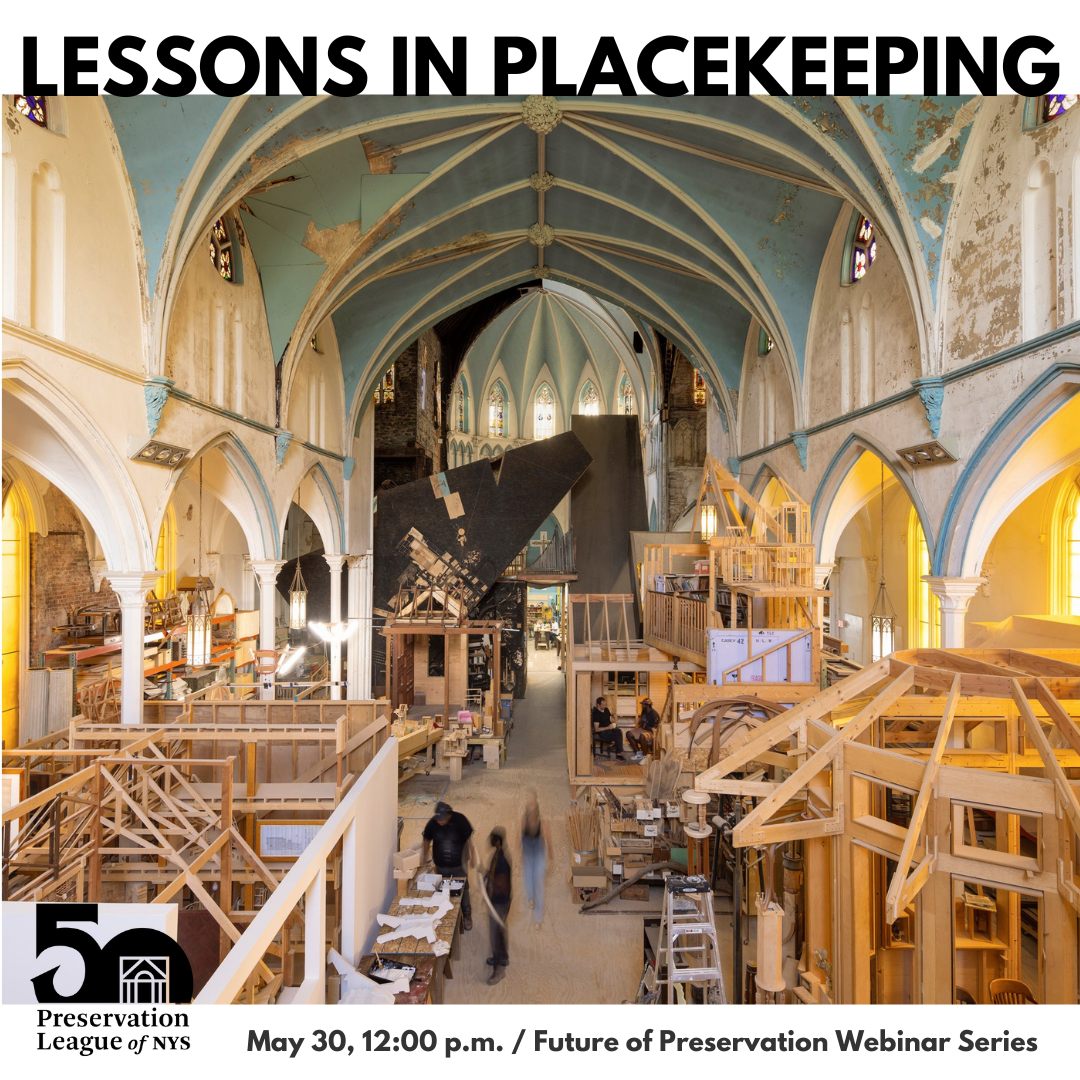
Join the Preservation League of New York State on Thursday May 30, for the next Future of Preservation panel discussion: Lessons in Placekeeping. In this webinar, you'll hear from sociologist and photographer David Schalliol and Assembly House 150 Founder Dennis Maher about their respective work and how that work has intersected. David and Dennis will be joined in conversation by Jenni Minner, Director of Graduate Studies, Associate Professor, and Director of Just Places Lab at Cornell University College of Architecture, Art, and Planning.
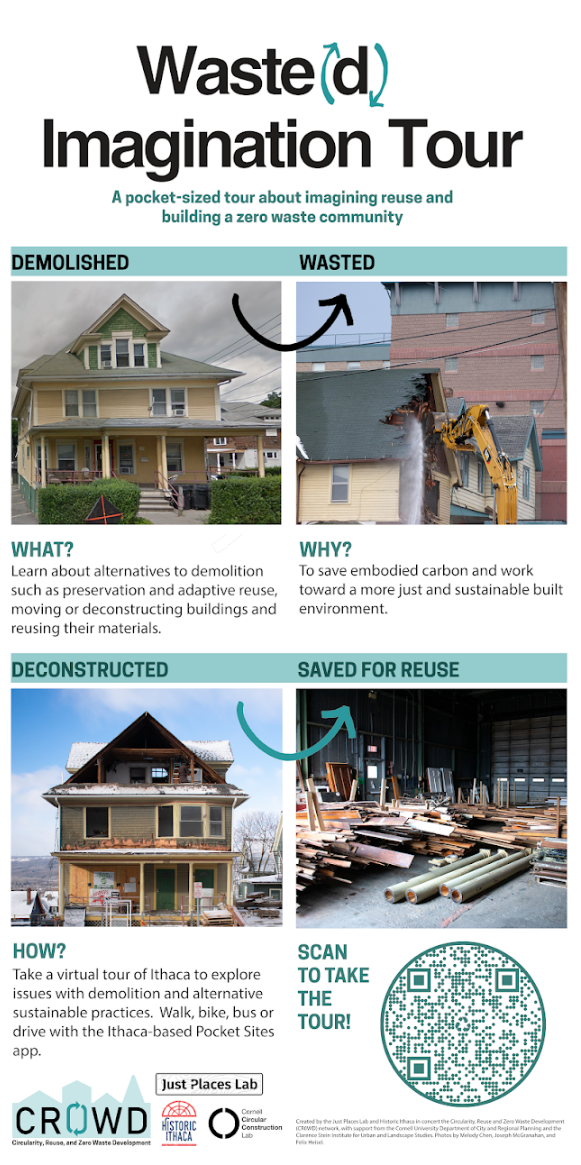
The Waste(d) Imagination Tour spurs us to achieve greater sustainability and circularity in the built environment. In the tour, you will learn about problems with demolition and the alternative methods that address them. These include sustainable practices like preservation and adaptive reuse, moving buildings, and systematically deconstructing buildings and reusing their materials.
This tour was created by the Just Places Lab, with assistance from Historic Ithaca. The Just Places Lab and Historic Ithaca are founding partners of the Circularity, Reuse, and Zero Waste Development (CR0WD) network, a group that works towards a more sustainable built environment in New York state. The content in this tour was sourced from CR0WD partners, including photographs and text contributed by Historic Ithaca, Finger Lakes ReUse, and the Circular Construction Lab at Cornell University.

The Just Places Lab team (Jenni Minner, Wyeth Augustine-Marceil, Ketaki Ghodke, Jeff Iovannone, Charles Zhang, Chloe Long and Medha Kulkarni) have mapped local sites demonstrating the challenges of creating circular construction economies and the opportunities there are in reusing building materials. With help from Historic Ithaca and in concert with the rest of the Circularity, Reuse, and Zero Waste Development (CR0WD) network the team has laid out the topography of circularity and reuse in Ithaca. Read more on Cornell AAP website and take the tour.
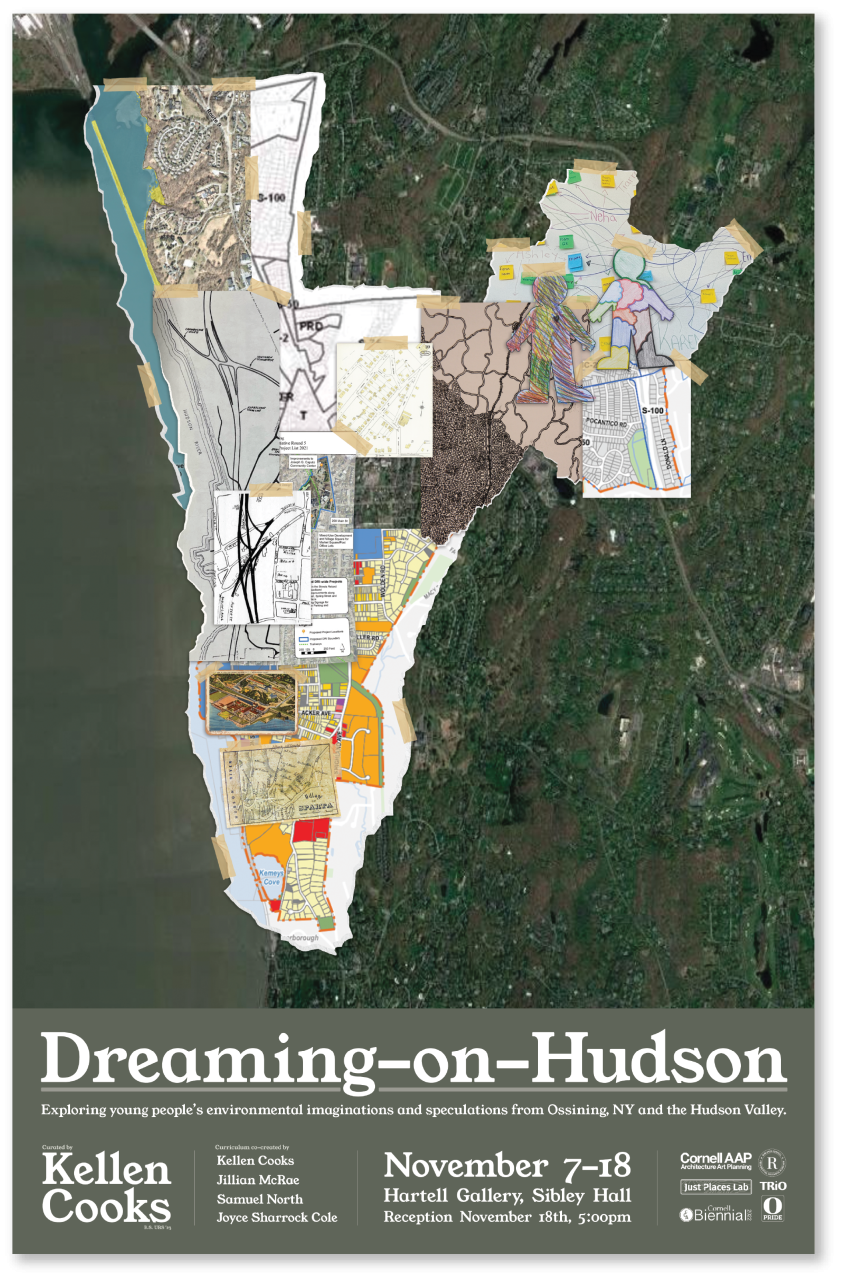
Dreaming-on-Hudson
November 7-18, 2022
Kellen Cooks’ Dreaming-on-Hudson exhibition was featured in the Cornell University College of Architecture Art and Planning’s Hartell Gallery. It was a part of the 2022 Cornell Council for the Arts Biennial, "Futurities, Uncertain.”
Dreaming-on-Hudson was curated by Kellen Cooks (B.S. URS '23) Curriculum co-created by Kellen Cooks, Jillian McRae, Samuel North, and Joyce Sharrock Cole.
This exhibition principally represents the progress of the Dreaming-on Hudson curriculum at Ossining High School in Ossining, NY, located in the Hudson Valley of New York. Materials produced by students over the past two months are exhibited alongside maps produced by Kellen Cooks and Thomas Petluck (B.S. URS '22), who are both 2019 graduates of Ossining High School. These are exhibited with other examples of environmental speculation from institutions and community groups in Ossining.
Dreaming-on-Hudson explores how spatial imaginations are produces from socially-diverse suburban communities, and how youth imaginations relate to the plans of established institutions within Ossining and the Hudson Valley. From this project, we can universally learn to question how the way in which a place is told shapes its identity, its communities, its development, and its future, within the Hudson Valley and beyond.
The Dreaming-on-Hudson exhibition was realized with assistance and advising by Dr. Jennifer Minner, Wyeth Augustine-Marceil, Melody Chen, the Just Places Lab, Dr. Raymond Craib, Dr. Derrick Spires, Tillian McRae, Samuel North, Joyce Sharrock Cole, and the students of SUNY Race. This project was funded by the Cornell Council of the Arts, the McNair Scholars Program, and the Rawlings Presidential Research Scholars Program.
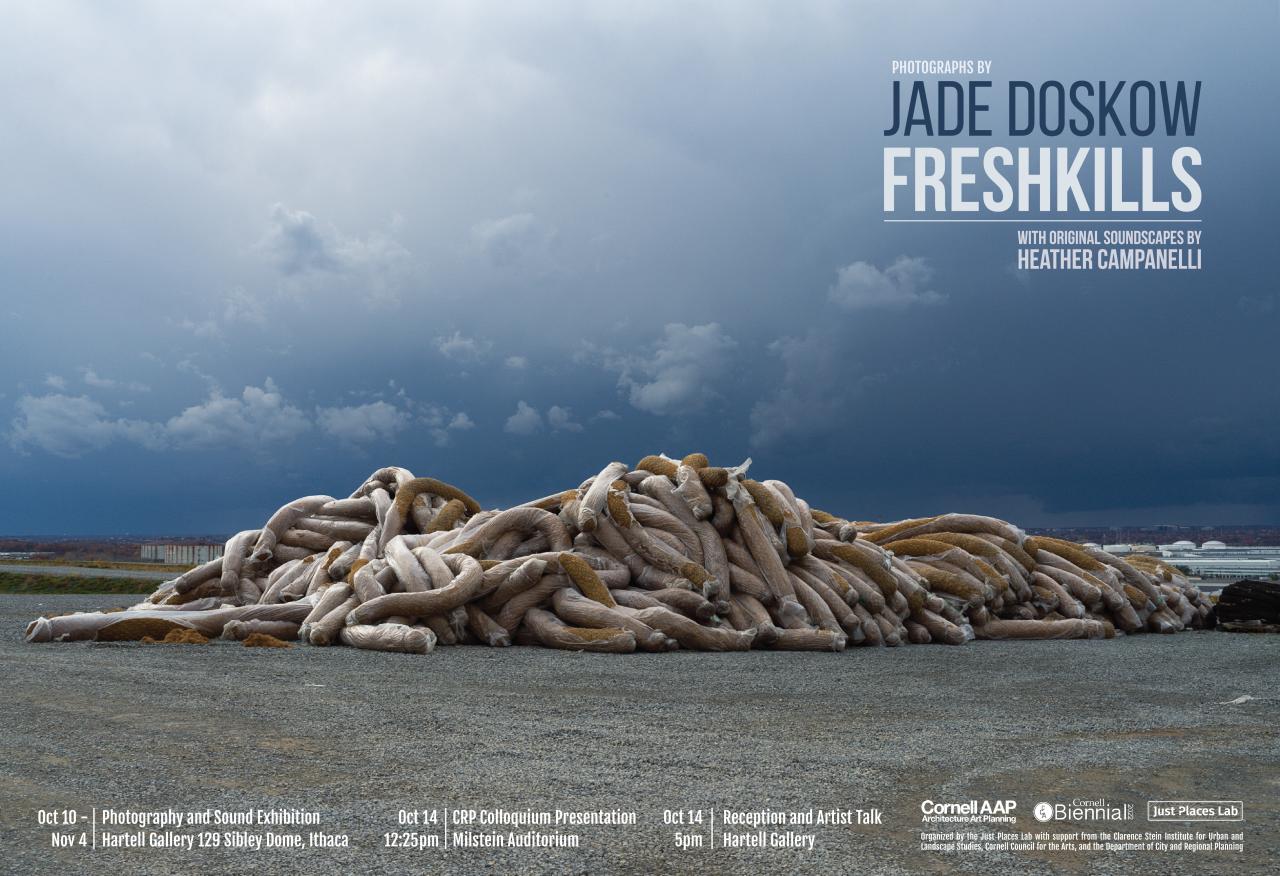
Freshkills, photographs by Jade Doskow with original soundscapes by Heather Campanelli
October 10 - November 4, 2022
As part of the 2022 Cornell Biennial, and the Just Places Lab 'Wasted Imagination' series, artists Jade Doskow and Heather Campanelli have assembled an exhibition focusing on Freshkills, the former site of the largest household waste dump on Earth and its transformation into a massive urban park in Staten Island, New York.
Jade Doskow is the Photographer-in-Residence of Freshkills Park in New York City. Doskow’s large-scale photographs of the iconic New York landfill-turned-park make clear its paradoxical, ethereal beauty while creating an important archive of a major chapter within the story of New York City’s infrastructure. The topography of the site–undulating and sculpted by sanitation engineers and through Doskow’s lens–offers its complexity through her careful and probing large-format work, playing with scale and form, abstraction, and figuration. Doskow’s photographs highlight the immense complexity of Freshkills, both the luminous, open, meadows as well as the highly engineered systems enabling this modern wilderness to function.
The exhibition will be held in the Hartell Gallery in Cornell's Sibley Dome from October 10 - November 4. Jade Doskow will be giving a CRP Colloquium presentation on October 14th at 12:25 in Cornell's Milstein Auditorium and hosting a gallery reception the same day at 5pm in the Hartell Gallery. Learn more about the exhibition and Jade Doskow.
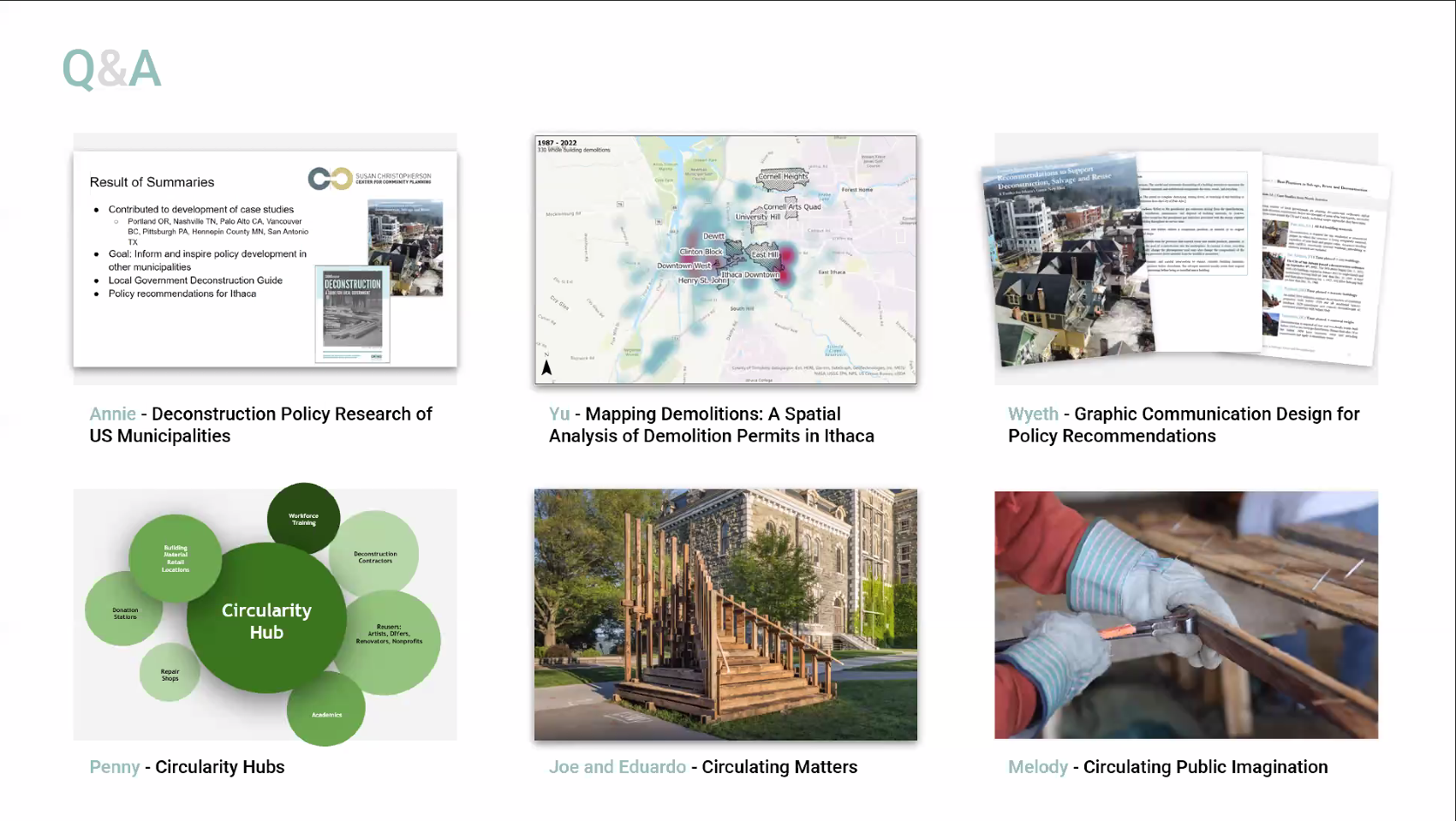
Deconstruction and Reuse Conference 2022 | October 20th 11AM EST | Virtual
Three Just Places Labs student researchers (Melody Chen, Wyeth Augustine-Marceil and Yu Wang) presented at the 2022 Build Reuse Deconstruction + Reuse Conference. The three JPL researchers, along with other students representing the Circular Construction Lab and the Susan Christopherson Center for Community Planning presented on their research for CR0WD. Students in the CR0WD. The CR0WD (Circularity, Reuse and Zero Waste Development) Network has leveraged its proximity to Cornell University to engage dozens of students from diverse fields, interests and backgrounds to conduct research, lead interviews, analyze data, and produce visual media - all to contribute toward the goal of a more sustainable built environment. Students will outline the work they do to support CR0WD, and how this work aligns with their own educational and professional goals, and how a wide range of expertise can support other reuse organizations.
Anchor Link: https://labs.aap.cornell.edu/just-places-lab/news-events#Deconstructing-Demolition An anchor to this page has been added. This tooltip is only visible to you.
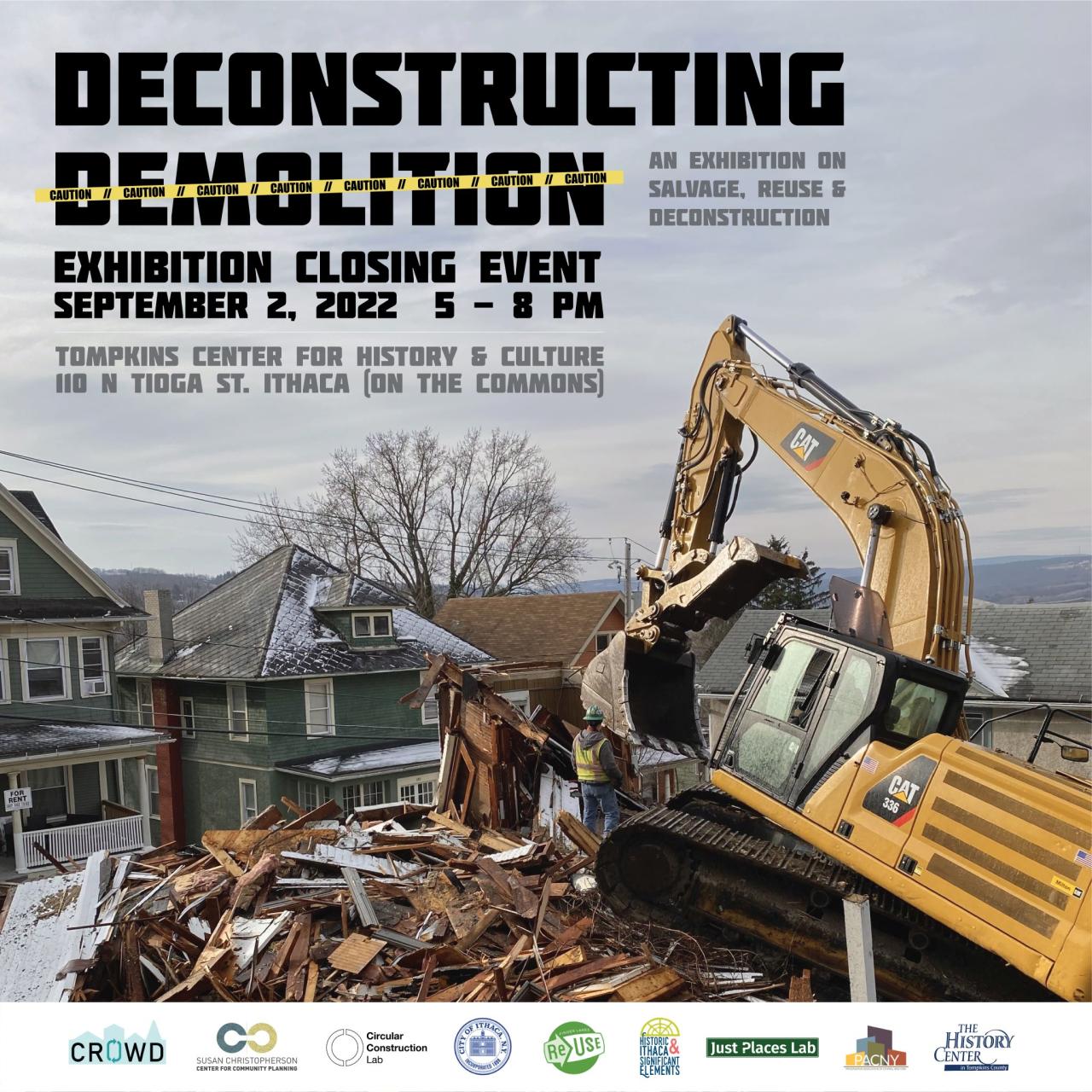
Deconstructing Demolition Closing Event
As a part of the partner network CR0WD (Circularity, Reuse and Zero Waste Development), the Circular Construction Lab and the Just Places Lab are co-curating the exhibition Deconstructing Demolition. The exhibition will be hosted from May 11 - September 3 2022 in the atrium of the Tompkins Center for History and Culture located at 110 N. Tioga St. in downtown Ithaca, New York.
The Organization of Cornell Planners (OCP) + Circularity Reuse and Zero Waste Development (CR0WD) network (which includes the Just Places Lab) have organized a closing reception at the Deconstruction Demolition exhibition!
Join us this Friday, Sept 2nd from 5-8pm at the Tompkins Center for History and Culture (on the Commons) – 110 N. Tioga St.
The event is during Downtown Ithaca's Gallery Night - an art walk held every first Friday of the month. We welcome you to stop by to mingle with MRPs, faculty and community members involved with CR0WD. We'll have a short presentation at 5:30pm on deconstruction, salvage and reuse, and CR0WD’s efforts followed by refreshments.
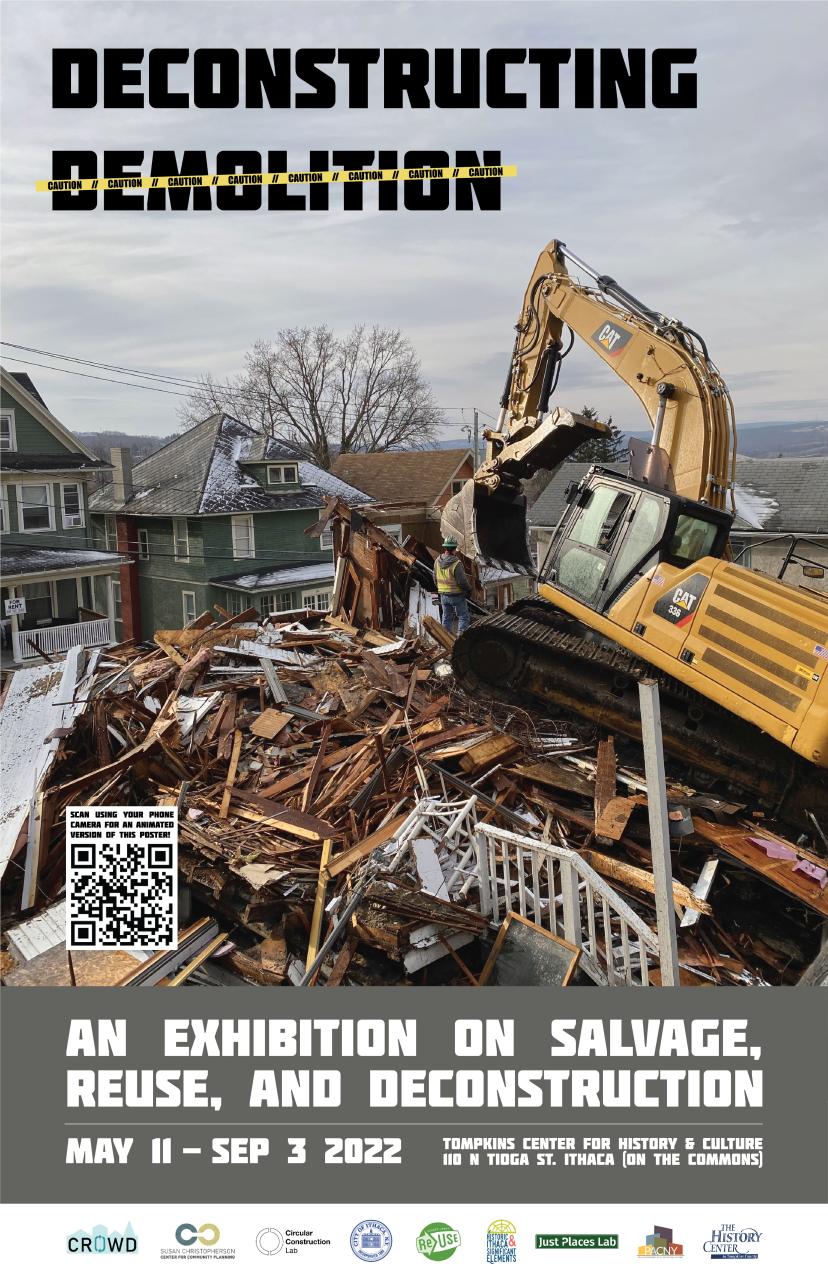
Deconstructing Demolition: An Exhibition on Salvage, Reuse and Deconstruction
May 11 - September 3, 2022
As a part of the partner network CR0WD (Circularity, Reuse and Zero Waste Development), the Circular Construction Lab and the Just Places Lab are co-curating the exhibition Deconstructing Demolition. The exhibition will be hosted from May 11 - September 3 2022 in the atrium of the Tompkins Center for History and Culture located at 110 N. Tioga St. in downtown Ithaca, New York.
The exhibition combining physical building materials with augmented reality and interactive visuals is intended to introduce a general audience to the negative externalities of extant demolition practices and provide information on alternatives in the form of salvage, reuse and deconstruction. Alternatives to demolition are presented through the lenses of environmental sustainability, preservation of community value, employment opportunity, and a reimagining our relationship to the built environment.
As part of the collective effort to put on the exhibition, members of the Circular Construction Lab captured materials and video, conducted research and calculated environmental impacts, as well as curated and built the exhibition. Credits for the exhibition go to Cornell Circular Construction Lab (Felix Heisel, Allexxus Farley-Thomas, Andrew Boghossian, Melody Chen, Joseph McGranahan), Cornell Just Places Lab (Jennifer Minner, Wyeth Augustine-Marceil, Melody Chen, Wen He, Mariam Fatima), Susan Christopherson Center for Community Planning (Gretchen Worth), Historic Ithaca, Significant Elements (Susan Holland, Christine O’Malley), Finger Lakes ReUse (Diane Cohen), Contento Recycling (Anthony Contento). Thank you to generous support from the David M. Einhorn Center for Community Engagement, the Clarence S. Stein Institute for Urban and Landscape and the Cornell Department of City and Regional Planning and Fred Cowett and Diana Reisman.
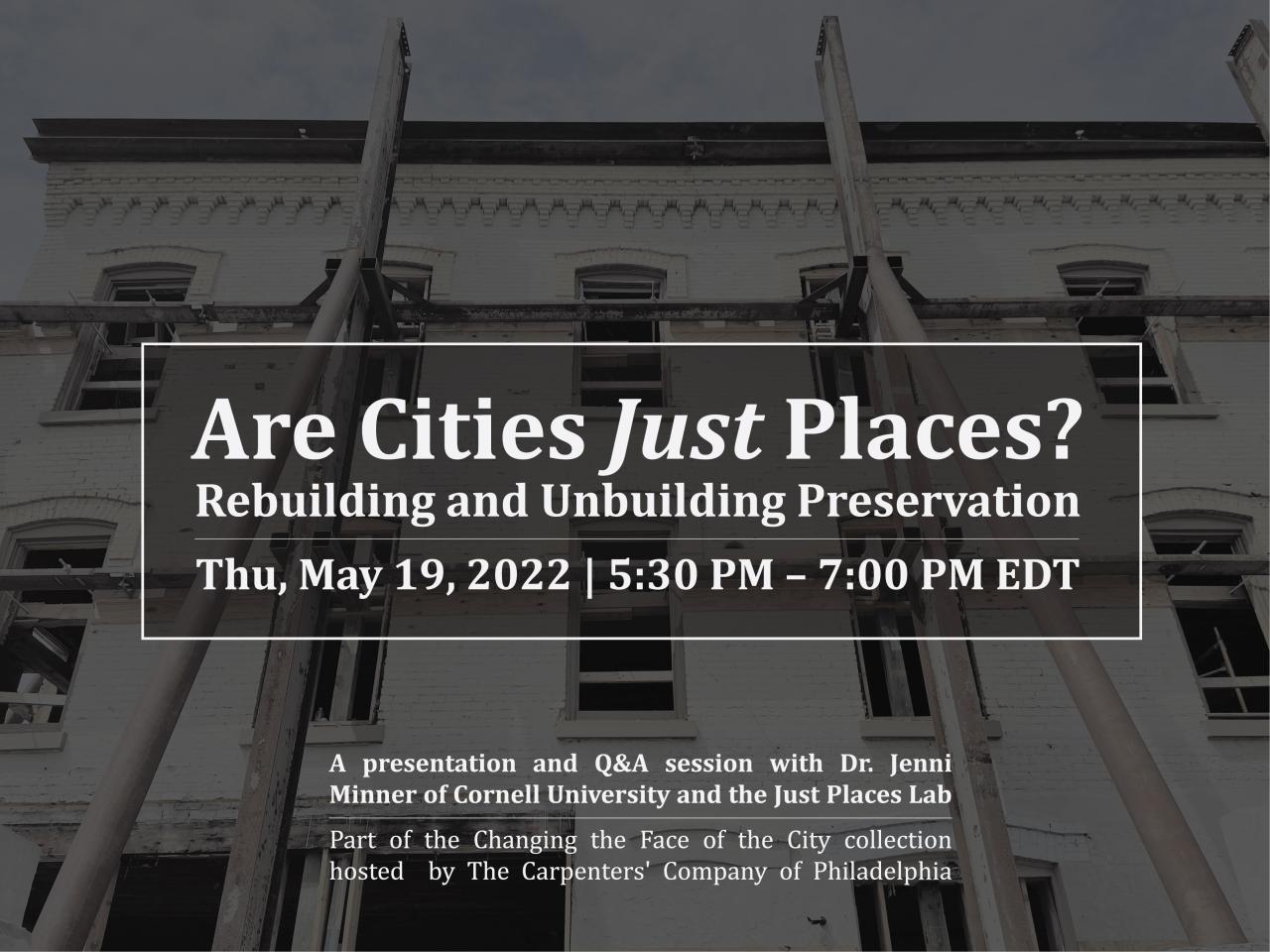
Are Cities Just Places? Rebuilding and Unbuilding Preservation
Thursday, May 19, 2022
Part of the Changing the Face of the City collection, hosted by The Carpenters' Company of Philadelphia
Dr. Jenni Minner of Cornell University and the Just Places Lab will be exploring the ways in which the care of places and the built environment can work toward social justice and how preservation is being challenged and re-envisioned today. Her presentation will discuss ways in which the rebuilding and unbuilding of places can aid in working toward more equitable community preservation practices. One example revolves around lessons from a network of organizations engaged in arts, place-making, and ‘equity preservation’ in Buffalo, New York. Another example is from the establishment of the Circularity, Reuse, and Zero Waste Development (CR0WD) network, which was inspired by reuse networks in the U.S. and circularity initiatives around the world.
This program is part of the Changing the Face of the City speaker series. Throughout this year, The Carpenter' Company of Philadelphia will present a series of programs and events that explore the intersection of historic preservation and urban planning/renewal through the lens of equity and social justice. “Changing the Face of the City” was the phrase renowned urban planner Edmund Bacon used to describe Philadelphia’s renaissance in his classic 1967 book Design of Cities, unintentionally alluding to the literal consequences of many preservation, planning, and renewal efforts.
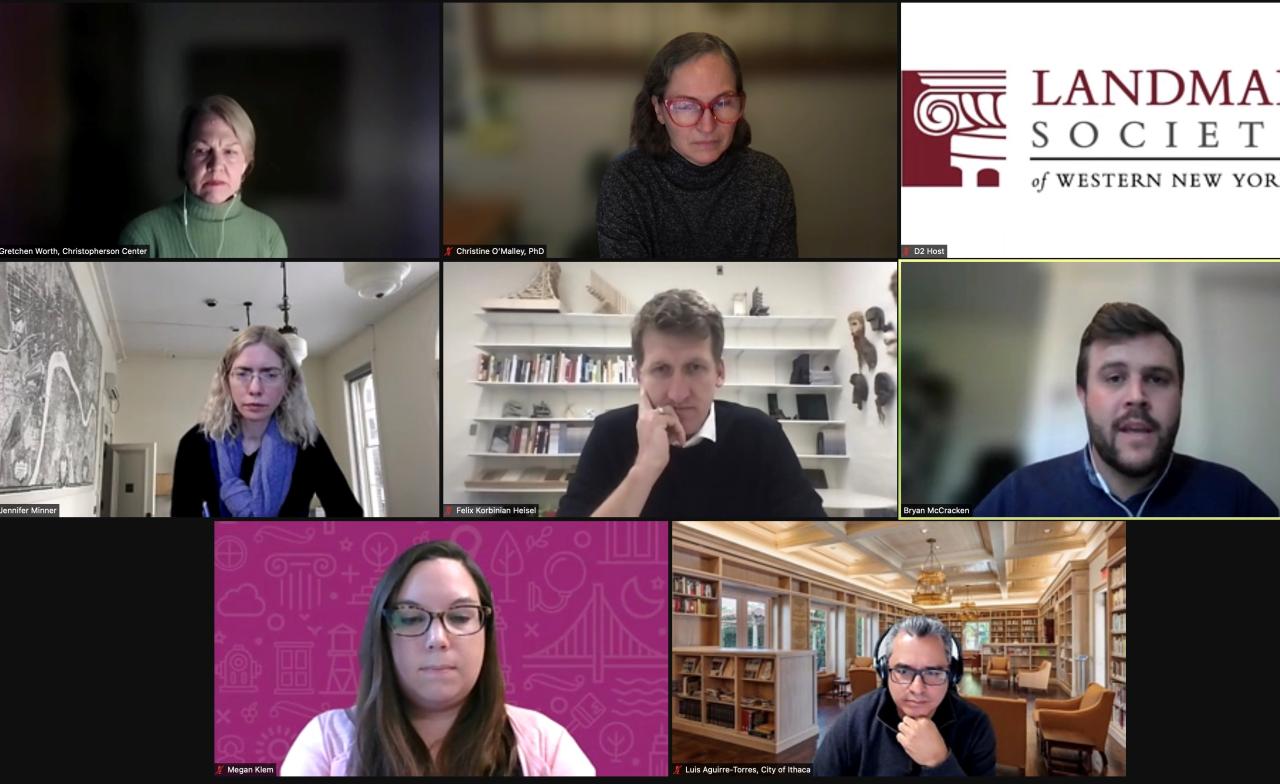
Joining the CR0WD: Creating a Coalition of Preservationists, Planners, and Architects to Promote Circularity and Reuse
at the New York Statewide Preservation Conference
Thursday, November 18, 2021
According to the Environmental Protection Agency, the United States generated 600 million tons of construction and demolition debris in 2018, making it the largest single component of landfill waste (40%). Sadly, the vast majority of construction debris (90%) results from demolition rather than new construction. As preservationists, our primary efforts are directed at saving buildings and promoting adaptive reuse. But what role can we play in advocating for a more sustainable future when it comes to demolition? How can we address the issue of demolition debris and waste through deconstruction and reuse? The panelists, all partners of the recently created working group known as CR0WD (Circularity, Reuse and Zero Waste Development), will discuss their collaboration and goals along with their research and advocacy efforts.
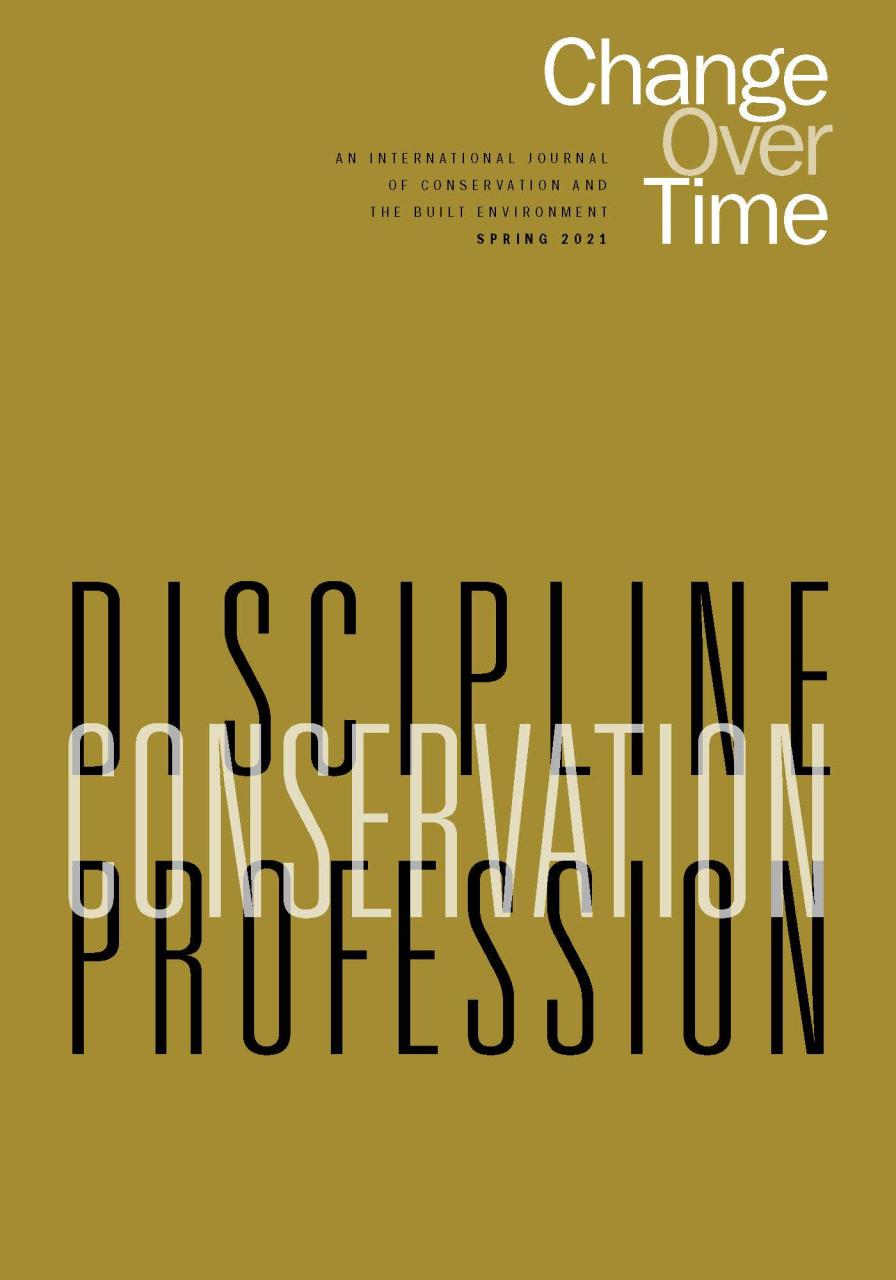
Conservation: Discipline & Profession
Wednesday, November 17, 2021
Change Over Time in its latest COT Dialogue celebrates the launch of the issue “10.1 Conservation: Discipline & Profession.” Since its emergence, in the 20th century, modern conservation has matured into a discreet field of intellectual inquiry and an interdisciplinary professional practice. This issue of the journal examines the challenging questions of disciplinary and professional boundaries asking such questions as: What are the disciplinary implications for an interdisciplinary field? How can the profession fulfill its greatest civic promise? And, what are the responsibilities, ethics, and authority of the preservation professional?
Speakers:
Frank Matero, Chair, Graduate Program in Historic Preservation, Weitzman School of Design, University of Pennsylvania;
Caroline Cheong, Assistant Professor, History Department, University of Central Florida;
Jennifer Minner, Associate Professor, Department of City and Regional Planning, Cornell University
will discuss what they perceive to be the prevailing challenges of the discipline and profession as well as the ways in which conservation is being effectively employed to achieve its mission of public good.
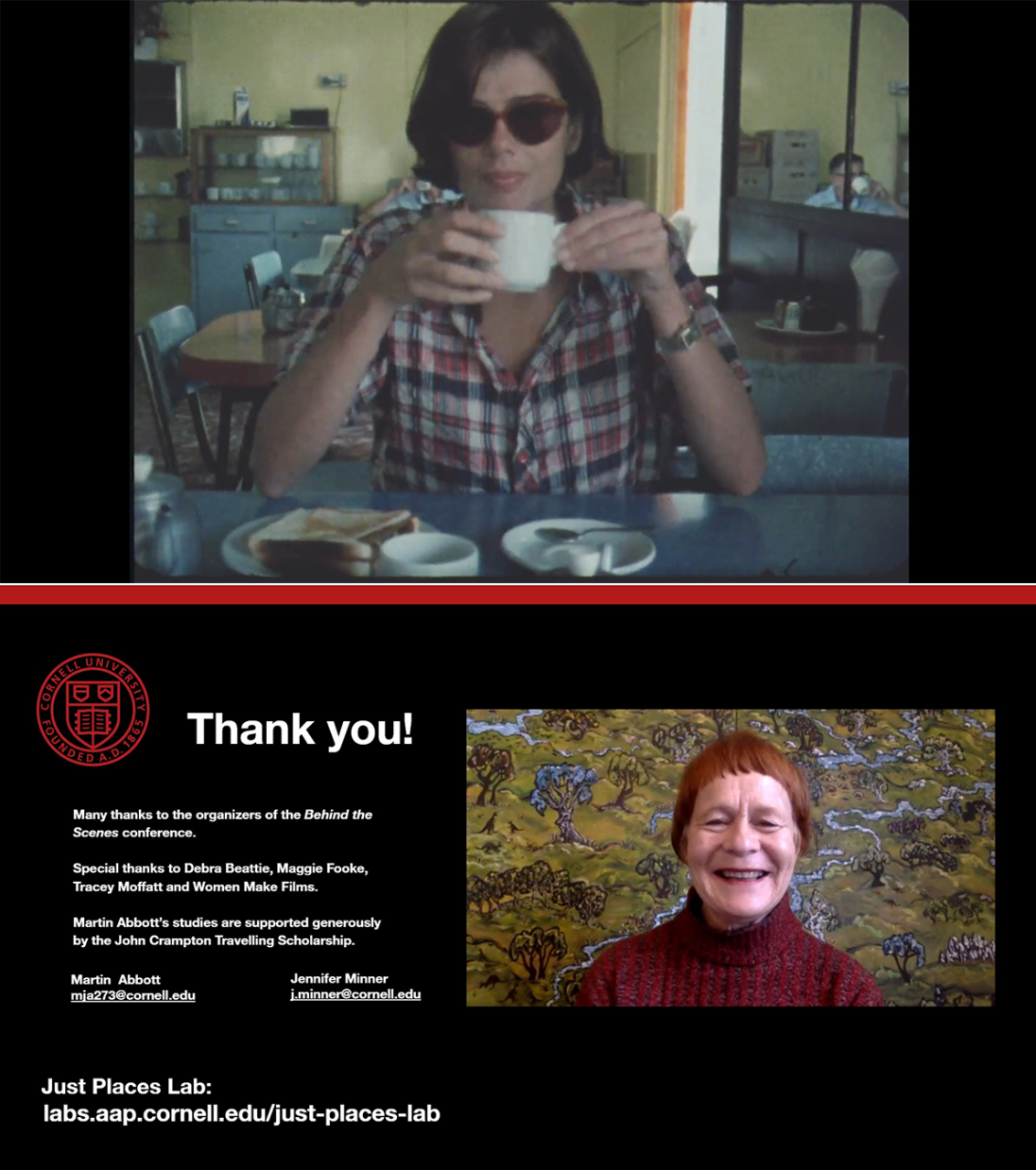
Behind the Scenes of the City
Martin Abbott and Jennifer Minner presented at the Stockholm City Museum's conference Behind the Scenes of the City: The Hidden, the Forbidden, the Forgotten. Their paper is titled Hidden projections: cinematic resistance from the urban interiors of Australia.
Social upheaval reverberated throughout Australia in the 1980s. On the East Coast, redevelopment projects in Brisbane, Melbourne, and Sydney sought to upscale urban life. Settler urbanism erased neighbourhoods and communities and their histories; replacing them with whitewashed versions of urban culture and consumption, comfortable and affordable only to some. However, the colour of everyday life that bound these cities together was not erased entirely and was captured in the interstices of essay films from this tumultuous decade.
This presentation examines class, gender, and race relations in subversive scenes of urban life captured in feminist and Indigenous cinematic landscapes. Three short essay films are featured: a pickup scene in a Sydney pub from Tracey Moffatt’s Nice Coloured Girls (1987); Melbourne’s lost ballrooms and beachside community spaces in Maggie Fooke’s Pleasure Domes (1987); and Brisbane’s cafes and balconies in Debra Beattie's Expo Schmexpo (1984). The three films polemicize the changing interior of Australian cities during the 1980s. The films contribute to a broader movement within Australian cinema that emerged in resistance to neoliberal urban redevelopment practices and the assertion of Aboriginal cultures and rights.
Image left, top: Debra Beattie is show drinking tea at the California Cafe in Brisbane, QLD, Australia. Still from the film Expo Schmexpo. Bottom slide from Martin Abbott and Jennifer Minner's presentation thanking directors and conference organizers. The photograph on this slide is of Maggie Fooke during a 2020 interview.
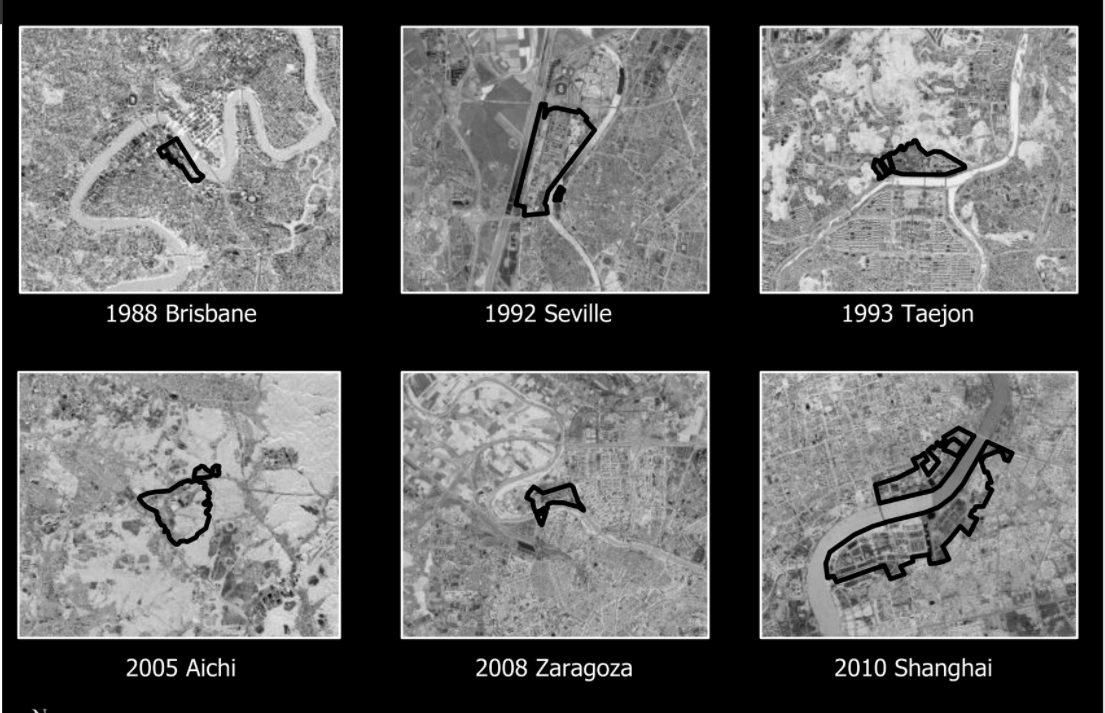
Peering into mega-event impact craters: post-expo urban development and the pursuit of just places
Jennifer Minner and Grace Yixian Zhou (MRP '19) presented the paper "Peering into mega-event impact craters: post-expo urban development and the pursuit of just places," which was co-authored with Brian Toy (MRP '21). In this paper, the researchers develop a post-expo development typology based on an examination of “mega-event meteor craters,” the former sites of mega-events in the years after they have been staged. The authors present a framework specific to post expo urban development types aimed comparing the impacts of these mega-events and guiding efforts at developing more equitable urban development even many years after an event has taken place.

Three October Presentations on Circularity, Reuse and Zero Waste Development
During October, a team of partners from CR0WD, the Circularity, Reuse, and Zero Waste Development group, including the Just Places Lab team presented at two national conferences: the Association of Collegiate Schools of Planning and the Deconstruction and Reuse conference. The first event was a roundtable Building a Better Building Policy during the ASCP focal event Planning for Climate Justice. The second event was the panel "CR0WD: Making the Case for Collaboration." A third event is a poster presentation, including short video about CR0WD.
October 4, 2021
Race, Power & Preservation
Panel discussion organized by the Providence Preservation Society
Speakers: Tara Dudley, Jennifer Minner, Christine Malecki West, and Craig L. Wilkins
Preservation, far from representing a neutral position, is a symbolic, political act. For the better part of 50 years, preservationists have been working to “preserve historic character” and advance “appropriate” projects for historic neighborhoods — but who defines these terms and what un/intended results have they produced? In preservation and planning, too often these subjective ideas have been used as tools to reinforce existing power structures and racial bias in our built environment. Join PPS and national thought leaders for a discussion on the foundational terms historic preservation must reconsider in order to affect positive, systemic change here in Providence and more broadly
June 9, 2021
Critical Technologies: Urban Tech for Social Impact
How can technology help create more equitable cities?
The ongoing pandemic highlighted long-standing social inequalities. These inequities have manifested themselves in various ways and along multiple fracture lines (e.g. race and ethnicity, class, and disability) leading to limiting access to opportunity and public space in cities. Despite mounting inequality – and although theory, social research, and policy indicate the need for more equitable urban environments – social issues that lack spatial definitions remain hard to incorporate into the planning processes. There is a growing need for effective, technology-based, spatial tools to understand the mechanisms that create and distribute disparities through the city.
This conference will focus on the spatial dimensions of inequality in cities and will explore ways for technology to promote more equitable cities. It will bring together academic researchers from Cornell University, Cornell Tech, and the Technion, with practitioners from both NYC and Tel Aviv Planning Departments. The conference will map existing methodologies and planning tools regarding urban challenges based on state-of-the-art research in the field.

May 18, 2021
Letter to the Editor: Let’s not dump Ithaca’s buildings into the landfill
Ithaca’s recent effort to create and implement an Energy Code Supplement is a vital step to address our global climate crisis. These policies for new construction will help create more sustainable buildings and a more livable future for us all. But a complementary element is missing as we seek to move along a greener and more sustainable path: We need a plan for construction and demolition debris.
May 17, 2021
Break it Down: CR0WD Task Force Forges Zero Waste Goals
CR0WD, a Cornell-powered, community-led task force works with New York State communities to promote thoughtful building deconstruction and highlight the environmental, cultural, and, economic value of salvage, reuse, and closed material flows.
Friday, March 5, 2021
Mega-event Meteor Craters presented by Jennifer Minner, Nathan Revor and Martin Abbott in the Media Objects Conference.
In this talk, we use the meteor crater as a metaphorical object that describes an intellectual journey from the measurement of spatial impacts and tangible remnants and artifacts to an exploration of the reservoir of memories and media left in the wake of mega-events.
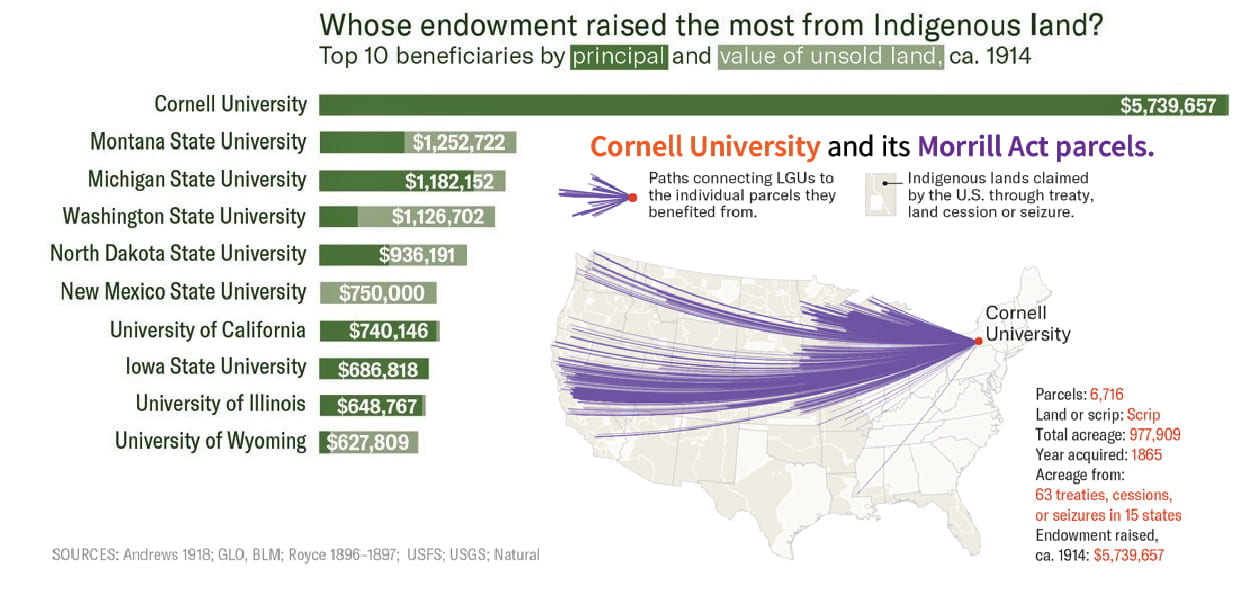
September 17, 2020
Cornell: A “Land-Grab University”?
Cornell has a moral obligation to acknowledge that its origins were based on a continental-scale program of Indigenous dispossession, and educate its faculty, staff, students, and the general public about this history and why it requires action in the present.
September 8, 2020
Faculty, Graduate Students and Staff for an Anti-Racist Cornell, 2020 Demands
We can no longer ignore the land and the labor at the core of the foundation of Cornell University’s endowment. The Ithaca campus occupies the traditional homelands of the Gayogo̱hó꞉nǫ’ (the Cayuga Nation), and Cornell’s other campuses and properties are in the traditional territories of likely every Indigenous Nation in the state.
August 14, 2020
Finding Utopia in ‘Apocalyptic Hudson River School Painting
Artist Jade Doskow's large-scale photography of the transformation of the former Freshkills dump was featured in two articles in the New York Times: "How the World’s Largest Garbage Dump Evolved Into a Green Oasis" and "Finding Utopia in ‘Apocalyptic Hudson River School Painting." Earlier in the year, students in Art, Preservation, and the Just City had the opportunity to preview her artwork at Freshkills.
August 12, 2020
Reshaping the Intersection: Living and Learning Difference and Coexistence in the City
Webinar organized by URS students Kellen Cooks, Thomas Petluck, Ayana Smith. Speakers: Justin Garrett Moore, Ernst Valery, Jennifer Minner. August 12, 2020.
May 29, 2020
Equitable Economic Recovery After COVID-19
Follow link above and register to view recording.
Building community partnerships will be a vital part of getting the economy back on track. Learn how grassroots organizations and local governments are coming up with some of the best policy responses to the COVID-19 pandemic.
Panel: Sam Magavern, Visiting Activist Scholar at Cornell ILR School; Rahwa Ghirmatzion, Executive Director at PUSH Buffalo; Russell Weaver, Ph.D., Economic Geographer at Cornell ILR Buffalo Co-Lab; Andrea Ó Súilleabháin, Executive Director at Partnership for the Public Good; and Jennifer Minner, Associate Professor at Cornell College of Architecture, Arts and Planning.
October 2019
A Journey in Space and Thought with Aboriginal Artist Jonathan Jones
During a visit to Cornell in October–November, visiting artist Jonathan Jones treated AAP faculty, alumni, and students to what Associate Professor Jennifer Minner, CRP, called "a journey in space and thought." It featured a cultural exchange of Indigenous knowledge and practices on two continents, crossing thousands of miles, Minner reflected.





